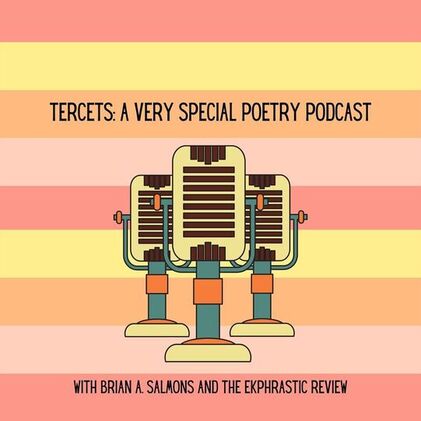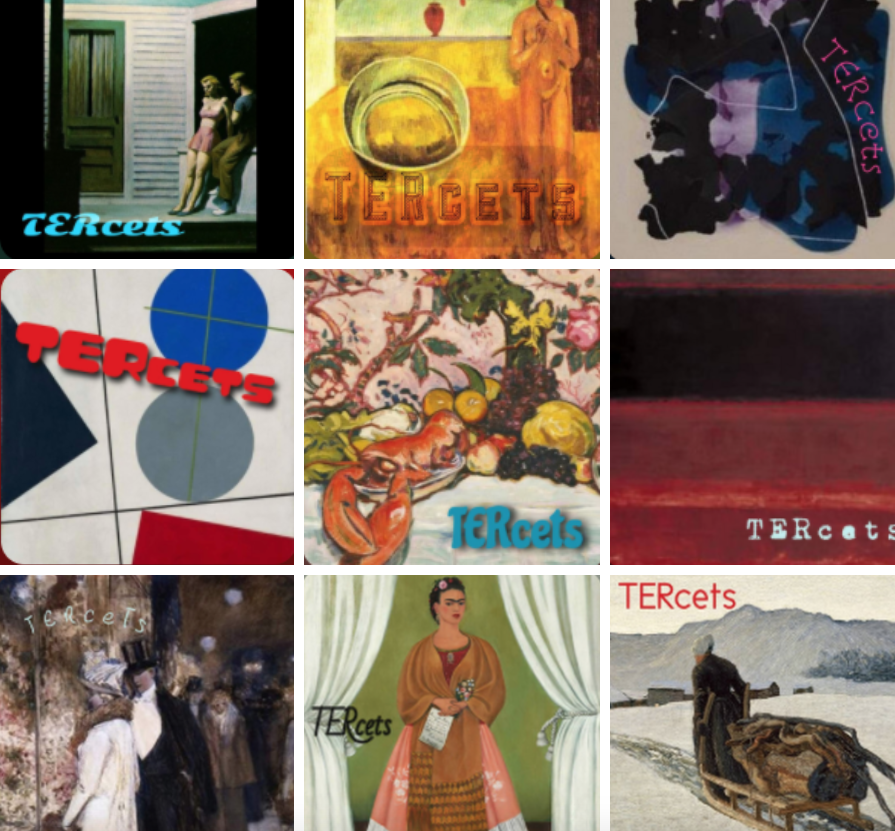|
TER: You’re a poet who has been involved with The Ekphrastic Review for some time, as our social media manager for Facebook and as a contributor. We’d love to know more about your writing life. Brian A. Salmons: My writing life has ebbed and flowed ever since middle school when I got my first guitar and began writing my own songs and lyrics. I took it very seriously when I was 14, so I count that as the start of it all. I wrote a little poetry in high school, but didn’t really start until I was in my 20s. All of it ‘for the desk drawer’ as they say. Just making sense of life. Then I stopped. Got married, started a family. It wasn’t until my 40s that I took it up again and decided to get it out there for people to read. My first poem was published in 2017 in a now-defunct online lit mag called Man in the Street Magazine. I haven’t published any chapbooks or books yet, although that’s definitely a goal. Being a spouse and a parent is a big responsibility, and I’ve realized that I need a creative outlet to help me handle that. So I make time for it, and I’m happier for it. What does ekphrastic writing mean to you? Tell us about your relationship with visual art. All art is referential to some degree, right? As a teenager, I fell in love with blues music, old blues from the 1920s and 1930s, Robert Johnson particularly. Their music sounded so pure and, to my mind, was the epitome of American cultural originality. But he and his fellow travelers didn’t just make up those songs. They were part of a tradition that borrowed from other musical practices from Africa and the British Isles. Music evolves from earlier forms of music. Variations on a theme. I understood this when I wrote music, and that carried over into my poetry. When I write, I need to listen to music. Some people need silence, or the buzz of a public space, but I need music. Whatever else inspires my writing, there is always a song there. And so when I learned of ekphrastic writing, it made total sense! Ekphrastic writing differs from critique in that ekphrastic writing doesn’t need to be “about” the work of art. Art is instead an inspiration, a prompt. It can bring a memory to the surface, or give new meaning to a well-trod one. It can spark the imagination and evoke a story that continues beyond the frame, the screen, the gallery. Ekphrastic writing is great for writers who like something to start with. It is a form of sorts, in that it constrains the writing, even if only by providing a point of departure or a trajectory. My belief is that good writing is not the product of genius or any sort of blessed originality. It always stands on others’ shoulders. I think writers should strive to be conscious of the sources of their inspiration, and to purposefully seek other inspiration. Ekphrastic writing embodies that value. Tell us about the evolution of TERcets. How did the podcast come into existence? I used to do a “podcast” using Facebook Live Audio called Brian and the Night (2017-2020). The premise was that I just sat on my back porch, at night, and read poems that I liked. It was fun for a while, but I could count my listeners on one hand and got discouraged. During those years I became involved with the Ekphrastic Review, and it eventually dawned on me that my time would be better spent doing a podcast that served an existing literary magazine, like yours. Thankfully, you loved the idea, and TERcets was born! Please explain the podcast name. “TER” is an acronym for The Ekphrastic Review, and I knew I wanted to include that in the name somehow. While perusing a list of words that begin with “Ter”, I was shocked, and more than a little fortunate, to find one related to poetry: “tercet”. A tercet is a poetic unit of three lines. From there, it was an easy decision to limit each episode to the very practical number of three pieces of writing. I am still madly in love with the name. Do you personally prefer listening to poetry and stories read aloud than to reading them? The irony of ironies is that I do not prefer listening to people read. I’ll qualify that by explaining that I prefer listening to recordings of readings over going and watching people read in person. I think it’s just the way my brain works: it is difficult to digest auditory information, particularly in a social context. That’s true for many people, but certainly not all, therefore I’m committed to producing TERcets knowing that I am making a small portion of the fantastic writing that The Ekphrastic Review publishes available in a format that will appeal to more people. I listen to a lot of other literary podcasts. And while I don’t often come away from an episode having digested everything presented, there is almost always that one piece of writing with that one line or lines that made me say “Mmm” out loud. That’ll stay with me and influence my thinking, and writing. I also do my best to share the piece on social media and tag the writers and publisher, to help promote their writing and just start a discussion. I hope TERcets does this for our listeners and The Ekphrastic Review’s writers. How do you choose the selection of works for each podcast? There is no real system. When I am ready to select works, I go to The Ekphrastic Review’s website and just start reading the most recent posts. I look for longer works that take a few minutes to read, but not too long - each episode is about 12-15 minutes long. And obviously I pick what appeals to me. There are many, many excellent works that do not make it into TERcets and, although I hate to admit it, that’s partly because I don’t read everything that The Ekphrastic Review publishes. There is just so much! I think it is a testament to the magazine’s popularity and importance to the ekphrastic writing community that it features such an abundance of good writing. What can you say to someone who hasn’t tuned in yet, or who says they personally prefer reading poetry or fiction instead of listening? I say that I totally get that, but give it a try anyway. The episodes aren’t very long, so you can easily listen to one while doing some minor chore around the house, or on a quick errand in the neighborhood. Like I said before, you don’t need to absorb every reading in the episode to get something from it. Often it’s just that one poem or story, or just one line, that will sink in and inspire. I am always glad when that happens to me, especially after I’ve started an episode and I’m starting to wonder why I’m still listening. Then, a little surprise! Also, every episode features 3 songs - in the interludes between readings - by independent musicians. I strive to incorporate good music that you’ve probably never heard before into the podcast, because music is just that important to me. So, even if you don’t like one of the readings, you might discover a new band or singer. Just sweetening the pot a little. What are your plans and hopes for the future of the podcast? I can’t imagine changing anything else about the podcast. I recently started having the writers send recordings of them reading their works themselves, instead of me reading them all. The feedback on that change has been great! I would like to publish episodes more often (right now it’s about a month between episodes), but I can’t make the time for that right now. I’ve considered doing special episodes with interviews and such, but we’ll see. My hope, and main goal, is that as we gain listeners, that’ll create more buzz on social media, which will feed back into The Ekphrastic Review’s submissions, meaning even more awesome writing for the website. TERcets exists to support The Ekphrastic Review. So as long as it does that, and our listeners enjoy it, we’ll keep it going. ** Begin exploring the podcasts here. Read an ekphrastic Indonesian poem and the translation by Brian A. Salmons here. Check out Brian's picks from the ekphrastic archives for Throwback Thursday.
0 Comments
Your comment will be posted after it is approved.
Leave a Reply. |
The Ekphrastic Review
COOKIES/PRIVACY
This site uses cookies to deliver your best navigation experience this time and next. Continuing here means you consent to cookies. Thank you. Join us on Facebook:
July 2024
|





